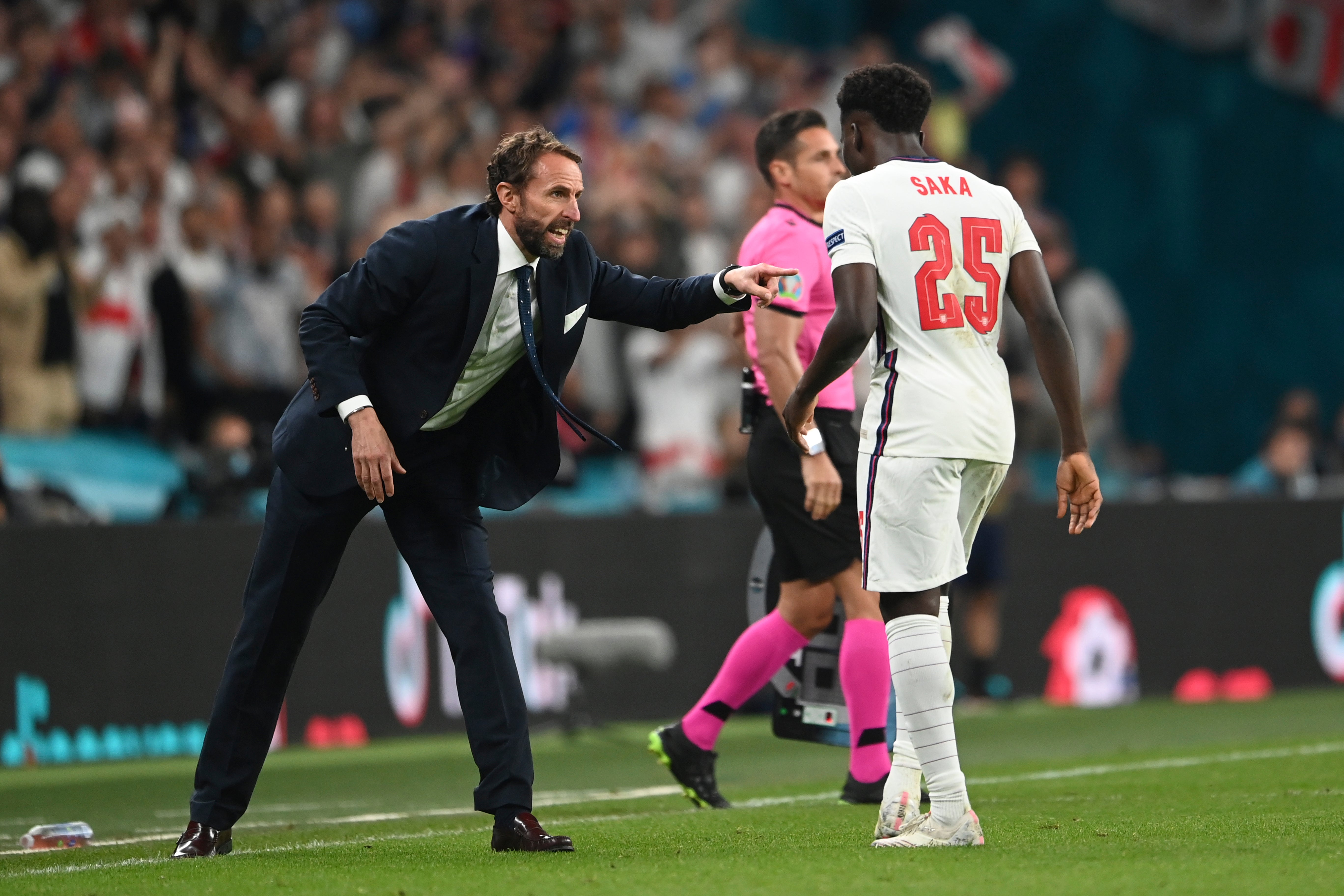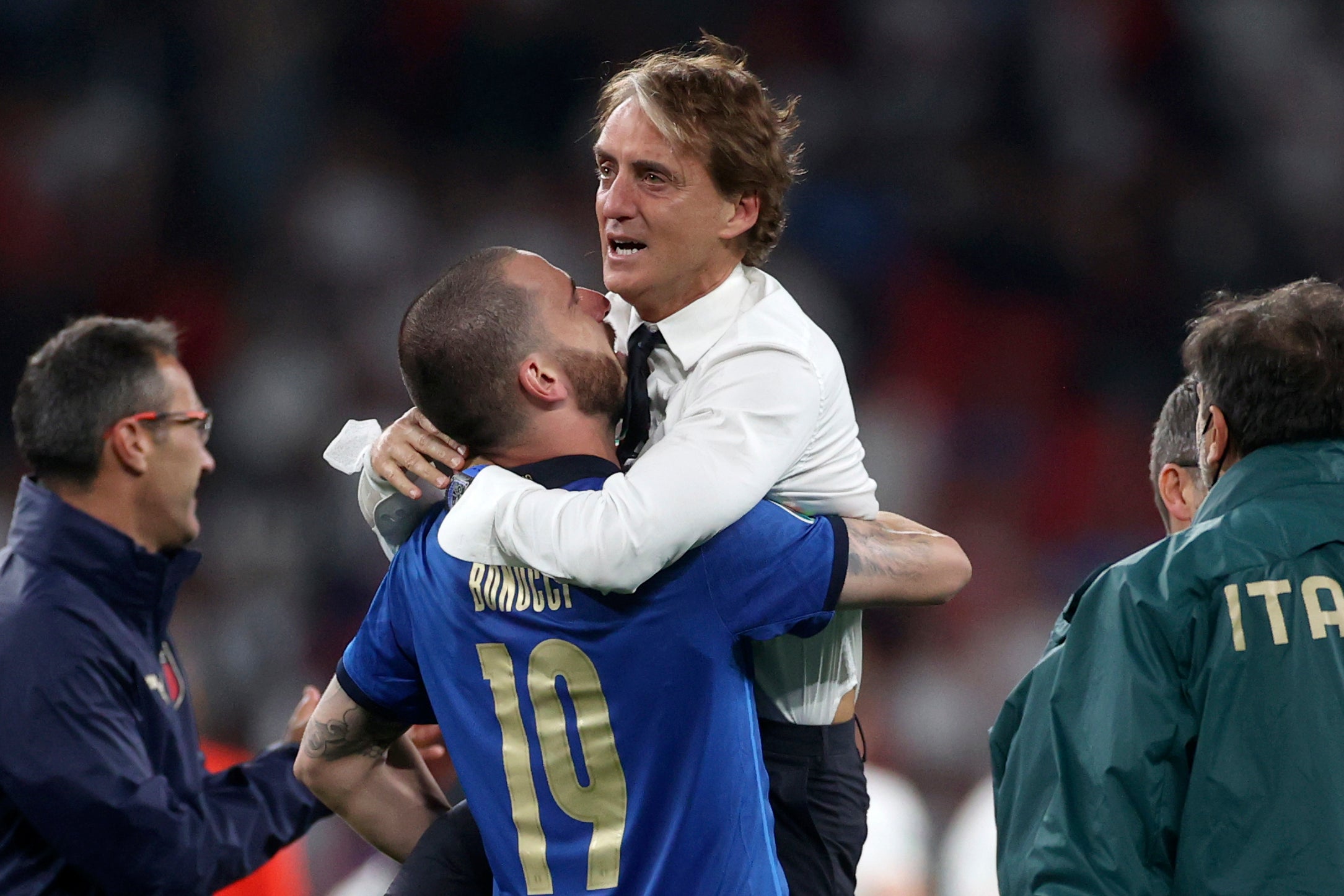Gareth Southgate fails to ‘smell the game’ as England come up short
England went from taking the lead in the Euro 2020 final only to fall to another ‘slow death’ as Italy eventually triumphed in a penalty shootout at Wembley
Your support helps us to tell the story
From reproductive rights to climate change to Big Tech, The Independent is on the ground when the story is developing. Whether it's investigating the financials of Elon Musk's pro-Trump PAC or producing our latest documentary, 'The A Word', which shines a light on the American women fighting for reproductive rights, we know how important it is to parse out the facts from the messaging.
At such a critical moment in US history, we need reporters on the ground. Your donation allows us to keep sending journalists to speak to both sides of the story.
The Independent is trusted by Americans across the entire political spectrum. And unlike many other quality news outlets, we choose not to lock Americans out of our reporting and analysis with paywalls. We believe quality journalism should be available to everyone, paid for by those who can afford it.
Your support makes all the difference.As the England players sat barely speaking in the dressing room, Gareth Southgate naturally said all the right words. It’s just that, whisper it, that might point to part of the problem.
He was later asked about what went wrong, and particularly the penalties. “It’s going to be heartbreaking for the boys but they are not to blame for that,” Southgate said. “That’s my call as the coach.”
The blunt reality is that there were at least three calls he got wrong.
One was the approach, as he gave way to what seems an inherent caution. It meant England gave up another considerable advantage, and the lead. It gifted the game to Italy.
There were then the substitutes, and how long it took Southgate to act. That played into the choice of penalty takers, which left the most inexperienced player in the squad taking one of the biggest kicks in England’s history.
Southgate later pointed to how they were tracking the spot-kick performance of the players, and that was why the five were picked as they were. Some close to the Arsenal set-up expressed surprise at this, given how few penalties Bukayo Saka even took as an underage player.
Either way, there was a bitter irony to England losing this tournament on penalties, given that this was one of the areas that Southgate’s staff had applied a lot of research and science to.
It’s just impossible not to wonder whether the side could have done with a touch more instinct and improvisation – and that’s in more than a few senses.
Even if it is true that tracking the data suggested Saka should take the penalty - and there’s no actual research to suggest a younger player will be more likely to miss one - was no one thinking that it might not have been the best idea to have a 19-year-old carry that specific responsibility?
It points to perhaps a fair remaining criticism of Southgate, when he obviously still deserves praise. He tries to manage by blueprint. It is as if every decision must be consulted with the manual.
That could be seen from the very start of the tournament in the way Southgate and Steve Holland spoke of having researched previous winners, and taking a lot from the Portuguese and French models.
Holland insisted on the eve of Euro 2020 that it wasn’t just “copy and paste”, but so much of what England do feels prescribed. Some on the Italian side felt there was a lack of “smelling the game”.
That meant that England didn’t press home when they had the lead and the initiative. It meant one of many advantages were squandered. It also went against what Southgate himself said.

One of his obsessions in the time between 2018 and now has been to work out how to avoid the “slow deaths” of so many England eliminations of the past, and – above all – the 2018 defeat to Croatia. These were those agonising inevitabilities where England would gradually cede possession and territory until they would eventually cede the game.
And yet how else would you describe this? England just sat back on their lead, inviting Italy on. That meant Roberto Mancini’s side didn’t just recover their focus after an atrocious start. They recovered all initiative.
The stats speak for themselves.
Italy had 62 per cent possession and 755 passes to England’s 341 – but their accuracy was 90 per cent compared to 78 per cent. That’s despite Southgate having more players of a higher technical quality, especially in attack. An admittedly brilliant Italian midfield led by Marco Verratti doesn’t sufficiently explain a difference that vast.
Much of it goes down to the approach. There were times when Leonardo Bonucci and Giorgio Chiellini were able to move forward with the ball for 20 to 40 yards with little to no pressure. It was remarkable. Southgate did recognise this.
“The way they used the ball tonight was a little bit better than us,” he began. “In the end we haven't been able to keep the ball well enough in the second period of normal time especially, that invited more and more pressure. It's something we know we have to be better at but the time to analyse that in depth is not at this moment.”
Southgate again speaks a very good game, but the reality was that the actual game was rather chastening. We’ve heard that before. We’ve seen that before. This was 2018 all over again, and that may well be true for more than just one match.
There is an argument – albeit an admittedly harsh one – that England still just went out to the first top side they played. It simply happened to be in the final here, not unlike Paris Saint-Germain in the Champions League in 2019-20.
They didn't have enough in their first truly exacting contest, and were maybe fortunate it didn't come earlier.
Southgate’s hesitancy on the bench was in contrast to the highly proactive Mancini. He couldn’t ultimately out-think the Italian. Mancini was always one step ahead and was indeed “smelling the game” much more quickly. He ended up having to change his entire forward line, with nothing like the options Southgate had, and he still kept Italy charged.

He did more with less. He sometimes went outside the box. He improvised. He went with instinct. This is what England needed more of. They instead rigidly stuck to the plan, rather than adapting to circumstances.
It should be stressed this isn’t by no means to write off the tournament or say Southgate should be criticised more than praised. He has still been responsible for great country-unifying moments that will be memorable to people for years. That is special. That means something. It points to how a good man and a decent coach is a fine facilitator of talent.
It is why he should of course still be celebrated. Managing by blueprint can – evidently – get you very far. It almost worked out. It was ultimately a spot kick away. But there is the question of whether it needed to be so close. There is the question of whether it should have been more.
As good as England’s overall performance has been when you stand back and look at the numbers, in the way Southgate has done, that overlooks some of the circumstances.
This tournament opened up in a rare way. England were first of all gifted a home tournament for all but one game due to Brussels first pulling out and then Dublin.
They were next gifted a hugely favourable path, as their side of the draw opened up, only for the other side of the draw to go the same way. France, the pre-tournament favourites, went out along with so many other big sides.
England then went ahead in the final against the team of the tournament. It was there for them… and they didn’t seize it. They didn’t seize the moment. It is possible that this is a rare moment, too.
Because, while Southgate’s formulaic approach came so close to working for this tournament, the fact it was based on Portugal 2016 and France 2018 should maybe point a different way forward. Both of those sides went out early this time, with their constrained plans looking very limited. Teams like Italy and Spain meanwhile showed that international football doesn’t have to be as constrained as people think; that there is possibility for expansion. Most of the tournament was attacking.
This might be the near future for international football. The game might be changing.
It is possible, then, this was the big chance for the approach Southgate selected. The next tournament might not be so favourable to it. Italy will build on this, and there is even the argument this win was ahead of schedule. Spain look like they have huge potential. France may learn the lessons of this, and still have supreme talent, as do Portugal. Germany will have Hansi Flick presiding over a good squad.
“These opportunities are incredibly rare but credit to Italy, they've been outstanding during the whole tournament,” Southgate said.
He again offered the right words. He spoke a good game. England didn’t really play a good game in the final, though, because they needed that bit more than a script.
It means they didn't get the ending that seemed so set up for them.
Join our commenting forum
Join thought-provoking conversations, follow other Independent readers and see their replies
Comments